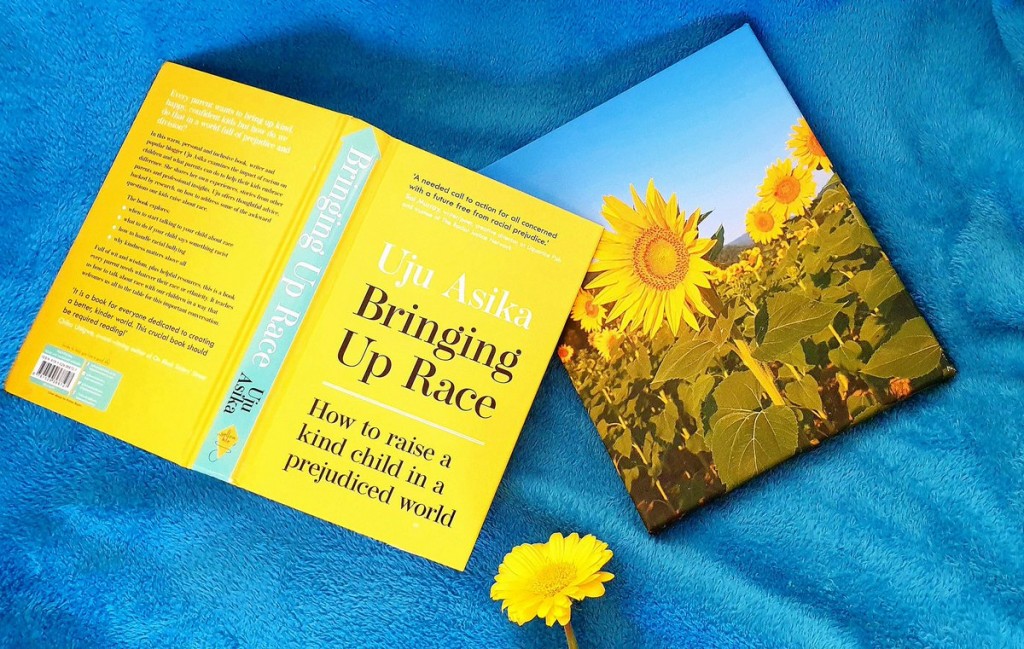As I sit down to write on Uju Asika’s Bringing Up Race: How to Raise a Kind Child in a Prejudiced World, the media is rife with the story of the killing of 20-year old Daunte Wright who was shot by a cop during a routine traffic stop in the US.
At first glance, Daunte’s death looks like a bad mistake. Bodycam footage shows him trying to flee from the cops which allegedly led to Officer Kim Parks erroneously deploying her gun instead of her taser. Sadly, it is hard to ignore the race factor with the sheer number of cop-related killings and brutality against Blacks that have been proven over time to be as a result of the colour of their skin only.
More than 6,000km away, a bullying story is currently rocking South Africa. 15-year-old Lufuno Mavhunga committed suicide after videos of her being slapped repeatedly by another student surfaced online. Reports say that this is not the bully’s first time.
When we see racist, prejudiced or problematic adults, we are quick to issue judgement while easily forgetting that an individual is the sum total of his lifelong experiences. Uju Asika takes us back to the beginning – not to the origins of racism which is as old as man himself – but to the early stages of an individual’s life, and how a child can buy into racist ideologies and grow into a prejudiced adult if parents do not make concerted efforts to talk about race and the dangers it holds for our world.

“Why is everyone so angry?”
Bringing Up Race: How to Raise a Kind Child in a Prejudiced World is packed full of stories from parents – mostly mums – raising Black, Asian and Minority Ethnic (BAME) children, who themselves belong to this group or have only recently married into this group.
It starts with a powerful preface that tells the account of the author having to deal with challenges in the hospital while she was pregnant all because she’s Black. And it goes up from there. Story after story of microaggressions, oppression and outright attacks from real people who have had to deal with them all their lives.
Have you ever read, heard, asked why or wondered why Black people are often ‘angry’, ‘frustrated’ or sometimes ‘difficult?’ Uju does not attempt to answer this question as much as she invites you to immerse yourself in the stories and use the verified studies in the book to understand why.
Very gently, the book unfurls the fabric of racism, asking readers to examine how they may have, through these kinds of questions or through their (in)actions, contributed to the problem and ended up unwittingly raising a new generation of racists or prejudiced children.
“We are all accountable.”
As parents, the natural instinct is to protect your child from anything that is bad and wrong with our planet. And so, without probably even realising it, we create mythical bubbles for our babies characterised by the avoidance of difficult conversations and distorted realities that favour a more acceptable world we believe is safer for them.
This is not the solution, the book argues. Children may be more innocent than adults, but they are just as human as we are. And just as we form our opinions from our everyday experiences, children too do the same with what they hear and see. Without guidance, they will come to their own conclusions and form their opinions because, “whether you like it or not, the world will spoon-feed your child ideas of what skin colour is best, which gender rules, who is worth more.”

“Kids do not see colour.”
With a pandemic that has forced us to pivot almost totally online, it is inevitable that children will stumble upon news and other information that we do not want them to see. Of course, restricting their access is an option, but they are naturally curious, and sooner or later, they would find out about the racial violence the Asian, Black, and other minority communities are currently facing.
You may think that your child will not view these happenings as racial crimes, even after these may have been clearly articulated in the media they are consuming. “Oh, my child does not see colour: (s)he regards everyone as humans,” you may say.
This is far from the truth, reveals Uju. Citing established research from different bodies, she explains that from as early as 3 months, children can differentiate between racial groups, gravitating more towards people whose faces match their own race. She also draws upon her own experiences as a Nigerian growing up in the UK, as well as the experiences from other BAMEs as additional proof that racism starts earlier than most parents are willing to admit.
Bringing Up Race: How to Raise a Kind Child in a Prejudiced World is an excellent, simple and straightforward resource for everyone who desires a better world than the one they grew up with, especially if that happened in a multi-racial society. It is for everyone who has been a victim of prejudice and is wondering how they can prepare their children to thrive in a world that has not really changed much. It is for non-BAME parents raising mixed-race children; for non-BAME parents raising non-BAME children, and for everyone trying to create a more equal society globally.
Above all, Uju Asika wants you, the reader to be “more compassionate with people like you and people who are nothing like you, [while you] raise children who are cool, kind and utterly themselves.”
Bringing Up Race is available at major bookshops including Amazon UK, Amazon (USA), Waterstones; Barnes and Noble; Bookshop UK and Bookshop USA (independent bookshop hub) and, Roving Heights Bookshop (delivery in Nigeria). Best option for free worldwide delivery is Book Depository.
